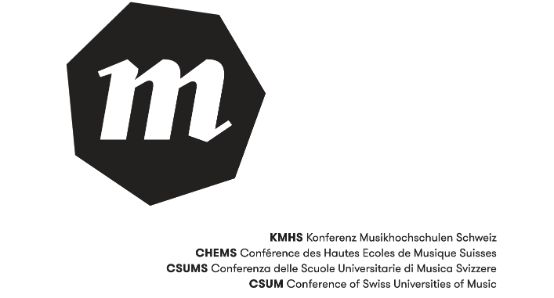Support for gifted children in Switzerland
In February 2017, the State Secretariat for Education, Research and Innovation (SERI) presented a report on the measures implemented and planned by individual cantons to promote talented students with a view to studying music at a conservatory.

Matthias von Orelli - A survey launched in spring 2016 served as the basis for the report, which was produced in collaboration with the General Secretariat of the Swiss Conference of Cantonal Ministers of Education (EDK). Fortunately, all but one canton took part in the survey, meaning that the overview obtained can be considered comprehensive. Here are a few relevant insights into this report.
In September 2012, the new constitutional article on the promotion of music education in Switzerland was approved. The introduction of this new constitutional provision and the adoption of the 2016-2020 cultural dispatch by Parliament also affect the music education offered at Swiss conservatoires. The cultural dispatch states that "... foreign students make up only 50 percent of all students at Swiss conservatoires, which is clearly too low...". In fact, the proportion of enrolled students with a Swiss admission certificate in the field of music at universities of applied sciences is quite low in comparison to other fields of study, which prompted SERI, the Federal Office of Culture (FOC) and the Swiss Conference of Cantonal Ministers of Education (EDK) to explore various possible solutions to improve the chances of admission for young Swiss musicians.
The report clearly shows that in all cantons, school authorities and school administrators are keen to support the development of musically talented young people as early as possible. In concrete terms, this means enabling young talents to take part in concerts and extracurricular musical activities alongside the school curriculum. This is of great importance, as the report also shows that students who have participated in cantonal talent development programs prior to their studies are very successful at the conservatory. This is accompanied by the finding that interest in music has increased and that an improvement in musical skills has been observed. This can be measured, for example, by the excellent results that music students achieve in performances or music competitions in Switzerland and abroad.
The increase in pupils' musical skills is a direct effect of the aforementioned support measures. Fortunately, the report also finds no fundamental conflict between an intensive musical education and successfully coping with everyday school life. For example, at the end of upper secondary level, around 100 pupils are already taking part in targeted measures to promote gifted pupils alone - sometimes with the clear goal of higher music education. This fact alone justifies supporting musically gifted pupils as early as possible.
Switzerland has a dense network of options for promoting musically talented young people, although these can vary from canton to canton. In some cantons there are measures to raise young people's general awareness of music (for example with workshops), in other cantons the measures are aimed at the specific promotion of talents that have yet to be discovered or whose talent is already established (for example in art and sports classes). And still other cantons concentrate on providing access to basic music lessons in the first place.
In cantons that have a conservatory, the offer is understandably more varied and more specific. In these cantons, the promotion of talented students with a view to studying at a conservatoire is concentrated on institutions that work closely with these conservatoires. These institutions function as points of attraction and competence centers and serve to promote exchange with upper secondary schools (for example with presentations by teachers from a conservatory at grammar schools and conservatories or the precolleges at the conservatories).
The sometimes scarce financial resources mean that the desired support measures for musically gifted children cannot always be offered as desired. The existing subsidies are often not sufficient to cover these costs. In addition, individual cantons that have a conservatoire have pointed out that the inclusion of students from outside the canton in the support measures sometimes fails because the canton of residence of the candidates concerned does not have adequate funding instruments. In principle, students from the respective canton are given preference when it comes to access to the support measures.
The report also takes a look at the financial contribution made by the pupils and their parents. This contribution usually depends on how intensive and demanding the musical education is. The closer a student gets to tertiary level, the higher the amount that parents have to cover. Various parties have therefore expressed a desire for scholarship opportunities for the period before entering a music academy, in line with the Confederation's stronger commitment to the "Youth and Music" program, which is set out in the 2016-2020 Cultural Dispatch.
In addition to the efforts for the measures listed in the report, the cantons also confirmed that they want to actively promote music ensembles, cultural promotion associations and musical events that are related to the musical culture of young people and a wider audience. The responses to the survey from the individual cantons confirm that great efforts are being made to develop musical skills at all levels of the education system and beyond. This applies not only to funding but also to the educational offerings. The report shows that against the background of all these measures to promote musical culture, it is difficult to imagine that highly talented young people could fall through the net. The very high success rates recorded for candidates with a Swiss admission certificate in the entrance examinations for music universities seem to confirm that the promotion of talented young people actually works.
However, one important question remains: What is the connection between the measures to promote musically talented students and the low proportion of foreign students in some degree programs at conservatories?
It is primarily up to the cantons to implement the aforementioned constitutional article on the promotion of music education in Switzerland at the level of educational institutions, and accordingly the cantons were also asked for support in finding ways to increase the proportion of students with a Swiss admission certificate at conservatoires. The report shows that the cantons with one university are not considering increasing tuition fees for foreign students or introducing quotas to increase the proportion of domestic students on music courses. In the extremely competitive environment of music, the quality and excellence of the candidates for a music degree should be the main criteria for admission to a conservatory. This position is underlined by reference to the expert conference of the Swiss University Council, which is convinced that, in the opinion of a majority of cantonal representatives, limiting the number of students with a foreign admission certificate would run counter to the excellence objectives of the conservatoires. The quality of applicants is therefore a priority.
In conclusion, the report shows that conservatoires and their teachers play an essential role in promoting musically talented young people, particularly in the run-up to music studies. This function is particularly important where young talent is promoted and trained in the Swiss education system. And - as stated in the cultural message - it has a further dimension, which is summarized as follows: "The seven Swiss music universities offer an excellent education with international appeal".








